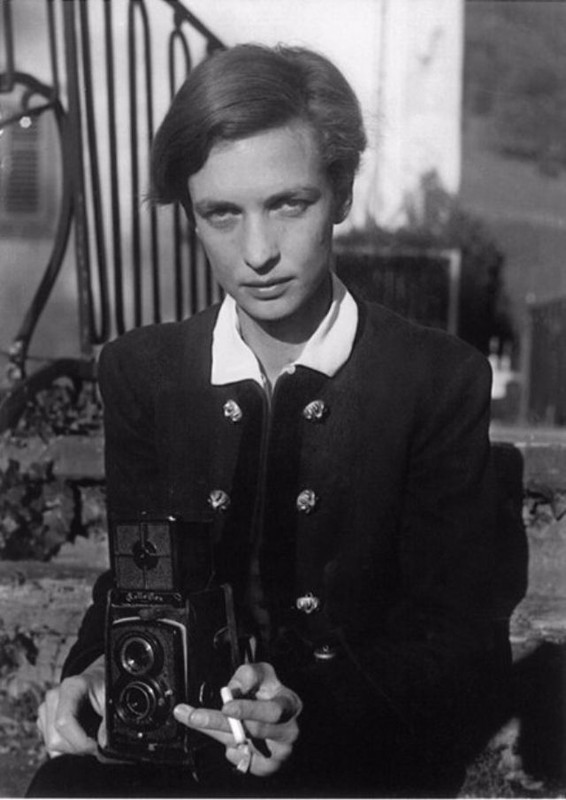Take a photo of a barcode or cover
A review by ilse
Lyric Novella by Annemarie Schwarzenbach
3.0
Spotting Thomas Mann’s name in the afterword and the year this novella was first published (1933) I was lured to pick Lyric novella from the shelf with new books in the local library. This slender book seemed to fit perfectly into a fresh Sunday morning ritual, consisting of reading a slim volume in bed while drinking coffee before the children are awake.
The afterword of the novella turned out more captivating than the rather sentimental story on unrequited love and obsession of a well-to-do law student getting lost in night life and addiction, risking to ruin a budding brilliant diplomatic career set out for him by his family for a mysterious night club singer surrounded by shady figures and secrets.
The brief life of the Swiss writer, journalist and photographer Annemarie Schwarzenbach (1908-1942) still seems to fire the imagination. Living most of her life abroad, she became close to Erika and Klaus Mann; Thomas Mann called her ‘a ravaged angel’. From the many glamourous black and white pictures and fragments dedicated to her which document her life it is not so hard to imagine how she acquired a cult status: living a bohemian and adventurous life, having relationships with several women, travelling to the United States, Persia and Afghanistan, taking an antifascist stance against her pro-Nazi wealthy family, addicted to morphine, inspiring a passion in Carson McCullers – and dying young.

Tantalizing and foreboding as the 1933 Berlin setting of the novella at first glance might look, the brief account in short chapters of the obsession with the cold and distant cabaret singer Sibylle juxtaposed and contrasted to the salutary reflective hours the narrator spends in solitude in nature however struck me as hackneyed and lacklustre - the later twist that Annemarie Schwarzenbach gave to the story by revealing after publication that the unnamed narrator is not a young man but a woman (so feeding the impression that the novella drew at least partly on her own life (and her infatuation with Erika Mann)) cannot save the story from its aftertaste of triviality. Atmospheric, elegiac in tone and lyrically written it might be, the contemplations of the narrator on lovesickness, fear of commitment and appending loneliness didn’t catch me as particularly acute, moving or revelatory.
If there is any silver lining to Schwarzenbach’s novella, it is that it reminded me of the invigorating Berlin cabaret song Das Lila Lied as sung by the ravishing Ute Lemper.
(** 1/2 )
The afterword of the novella turned out more captivating than the rather sentimental story on unrequited love and obsession of a well-to-do law student getting lost in night life and addiction, risking to ruin a budding brilliant diplomatic career set out for him by his family for a mysterious night club singer surrounded by shady figures and secrets.
The brief life of the Swiss writer, journalist and photographer Annemarie Schwarzenbach (1908-1942) still seems to fire the imagination. Living most of her life abroad, she became close to Erika and Klaus Mann; Thomas Mann called her ‘a ravaged angel’. From the many glamourous black and white pictures and fragments dedicated to her which document her life it is not so hard to imagine how she acquired a cult status: living a bohemian and adventurous life, having relationships with several women, travelling to the United States, Persia and Afghanistan, taking an antifascist stance against her pro-Nazi wealthy family, addicted to morphine, inspiring a passion in Carson McCullers – and dying young.

Tantalizing and foreboding as the 1933 Berlin setting of the novella at first glance might look, the brief account in short chapters of the obsession with the cold and distant cabaret singer Sibylle juxtaposed and contrasted to the salutary reflective hours the narrator spends in solitude in nature however struck me as hackneyed and lacklustre - the later twist that Annemarie Schwarzenbach gave to the story by revealing after publication that the unnamed narrator is not a young man but a woman (so feeding the impression that the novella drew at least partly on her own life (and her infatuation with Erika Mann)) cannot save the story from its aftertaste of triviality. Atmospheric, elegiac in tone and lyrically written it might be, the contemplations of the narrator on lovesickness, fear of commitment and appending loneliness didn’t catch me as particularly acute, moving or revelatory.
If there is any silver lining to Schwarzenbach’s novella, it is that it reminded me of the invigorating Berlin cabaret song Das Lila Lied as sung by the ravishing Ute Lemper.
(** 1/2 )